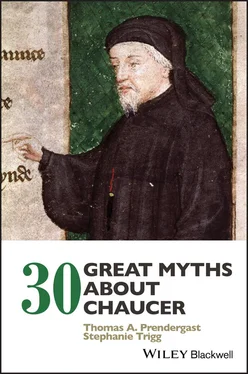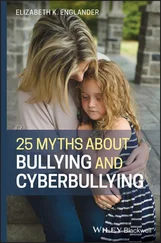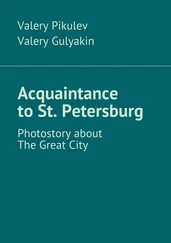Haweis’s speculation led several medievalists to weigh in on the potential legitimacy or illegitimacy of Thomas Chaucer, but it was Russell Krauss who wrote the most detailed defense of the position in 1932. 8 Krauss rehearsed earlier arguments and added some of his own, including Gaunt’s “life‐long interest in Philippa and Thomas” (as against his ignorance of Geoffrey later in his life), the coats of arms on Thomas Chaucer’s tomb, John Lydgate’s failure to mention that Thomas was Geoffrey’s son and the comment by Speght that started the debate about Thomas Chaucer’s paternity. 9
It is true that Gaunt favored both Philippa (sister to his wife) and Thomas. Philippa received a number of annuities from the Duke, and she was given New Year’s gifts several times through the 1370s and 1380s. 10 Thomas had a long career in the employ of the Duke and was well compensated throughout the 1390s. 11 Moreover, “John of Gaunt also interested himself in the affairs of Elizabeth Chaucer [Philippa’s daughter], since it was he who paid for her admission to the Black Nuns, a payment that has led some Chaucerian biographers to fear the worst.” 12 Geoffrey also received annuities, but these were given in part because of his wife’s services to John of Gaunt’s mother (Edward III’s queen, Philippa) and his wife (Constance). 13 It is possible that these annuities stopped after Philippa’s death, but the records of payments are imperfect and so it is difficult to draw any conclusions about Gaunt’s disinterest in Chaucer as opposed to his wife or son. We do know that Gaunt’s son, Henry of Derby, gave gifts to Geoffrey in the 1390s, while John of Gaunt was still alive, and once he reached the throne confirmed an annuity for Chaucer (even if that confirmation was delayed; see Myth 26) that may have taken the place of Chaucer’s annuity that had been given by John of Gaunt. 14 There is thus little indication that Gaunt or his house showed sufficient disinclination towards Geoffrey Chaucer or a sufficiently unusual inclination towards Philippa or Thomas to indicate a suspicious connection.
Krauss and others also maintain that it is telling that Geoffrey Chaucer’s arms do not appear on Thomas Chaucer’s tomb. Of the twenty shields on the tomb at Ewelme in Oxfordshire, the only male ones are those of the sons of John of Gaunt by Katherine Swynford, Philippa Chaucer’s sister. The arms of Philippa de Roët (the maiden name of Philippa Chaucer) are quartered with those of Thomas Chaucer’s wife, Maud Burghesh. The suggestion would seem to be that Thomas was the son of Philippa but not Geoffrey. Yet it was not abnormal for men to put their mother’s arms on their tombs if those noble connections surpassed their father’s. And, as it was Thomas’s daughter Alice, the wife of the Earl of Sussex, who raised the tomb, it is not unusual that she would wish to stress the Chaucers’ connections with nobility. 15
Finally, Krauss et al . argue that the omission of any mention of Thomas Chaucer’s relationship with his father in a poem by John Lydgate that was addressed to Thomas “has always been one of the worst stumbling blocks in the way of the view that Thomas was Geoffrey’s son.” 16 The logic is that Lydgate, who made something of a career out of encomia to Chaucer, certainly would have mentioned Thomas’s connection to “Father Chaucer” had Chaucer really been Thomas’s father. Of course, it is always risky to argue from negative evidence. There might be any number of reasons that Lydgate did not include genealogical information in his poem. But in any case, the work is an occasional poem that marked the departure of Thomas for France. It is also very much a work that celebrates “not literary but social and political associations. It accurately depicts Thomas Chaucer’s actual and symbolic role at Ewelme and its locality rather than his place in literary history.” 17
What we are left with, then, is Speght’s disavowal of what can only be called early modern gossip about the lineage of Thomas Chaucer. Krauss attempts to deal with Speght’s own dismissal of this opinion by claiming that Speght’s dependence on Glover’s pedigree is faulty, because it can only be based on heraldic information that we already possess, and so his interpretation is no more valid than Krauss’s own. His reasoning is that Speght and Glover were almost two hundred years removed from the poet and so they could not claim any special knowledge about the paternity of Thomas. But really this is very much what Speght says regarding the opinion about Thomas itself – he does not know of any grounds for the belief. Without grounds for the belief, all we really know is that the belief existed. And there are good reasons to think that the belief was mistaken.
First, it is not only Speght and Glover who claimed that Thomas was Geoffrey’s son. An action to recover debt was brought against Thomas Chaucer in 1396, and it explicitly names Thomas as Geoffrey Chaucer’s son. 18 And Thomas Gascoigne, early fifteenth‐century theologian and sometime Chancellor of Oxford, when writing about Chaucer’s supposed deathbed repentance (see Myth 27), also wrote “this same Chaucer was the father of Thomas Chaucer, Knight, which Thomas is buried in Ewelme near Oxford.” 19 Thomas Chaucer and Gascoigne both lived in Oxford at the same time (for sixteen years), so there is reason to believe that Gascoigne would have at least known who he was given Thomas’s social standing. Those who wish to make the case for Thomas’s illegitimacy have argued that Gascoigne is not reporting anything of which he has personal knowledge, but is merely making assumptions based on the fact that Thomas was raised by Geoffrey and Philippa Chaucer. One might well argue that such an assumption would be warranted (especially in the absence of any other compelling counter evidence), but there is another reason that we should believe Gascoigne. He was no friend of John of Gaunt and by extension was no friend of the Chaucers. He most likely concocted the slander that Geoffrey Chaucer attempted too late to repent his sins (comparing him to Judas; see Myth 27) and reported that John of Gaunt had been a “magnus fornicator” and had died of putrefaction of the genitals. Had there been any contemporary gossip about the legitimacy of Thomas, one would think that Gascoigne would have included it. 20 Finally, had Gaunt cuckolded Chaucer, “he [Gaunt] would not have been allowed to marry Chaucer’s wife’s sister because of the undispensable degree of incest involved.” 21 In addition, he would have been in a state of mortal sin and automatically excommunicated. As H.A. Kelly has said, “it is impossible to believe that he would have taken such a risk.” 22
Yet, despite the slender evidence supporting the idea and its sheer improbability, the belief has remained remarkably enduring. 23 There seem to be a few reasons for this. First, there is the delicious irony that the father of English literature (see Myth 1) might not have fathered his own child. Second, Geoffrey Chaucer’s poetic autonomy is reinforced. Any patronage flowing to Chaucer from Gaunt or his sons becomes a matter of reparation for a decidedly non‐literary injury. The poet’s art remains (seemingly) pure and unsullied by the ministrations of Mammon. Finally, it fits into a romantic notion of the suffering poet. Poor Geoffrey is betrayed by Gaunt, abandoned by Philippa and in old age, in serious debt (Myth 26), unable even to get his annuity from his “son’s” brother.
1 1Thomas Speght, ed., The Workes of our Antient and Learned English Poet, Geffrey Chaucer, newly Printed (London, 1598), b5r.
2 2Ibid., b5r.
3 3Thomas Tyrwhitt, ed., The Canterbury tales of Chaucer: to which are added, an essay on his language and versification; an introductory discourse; and notes (London, 1775–78), 1:xxxiii.
Читать дальше












